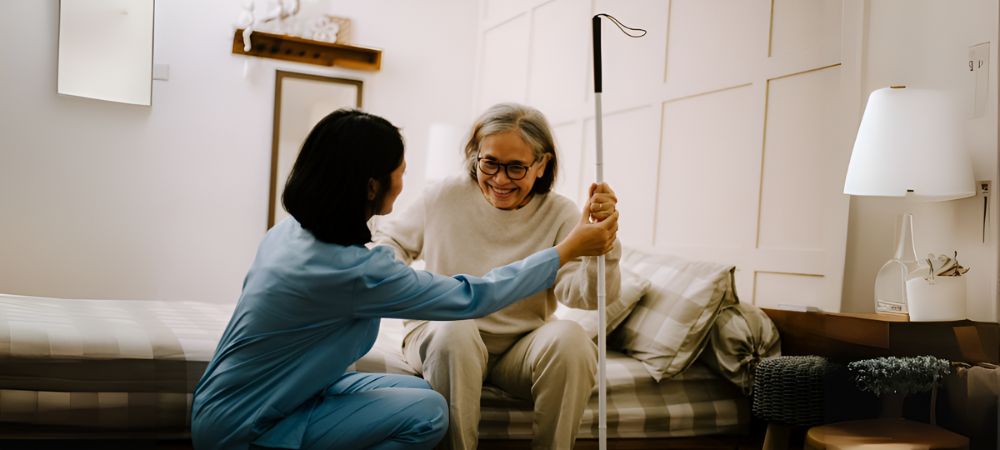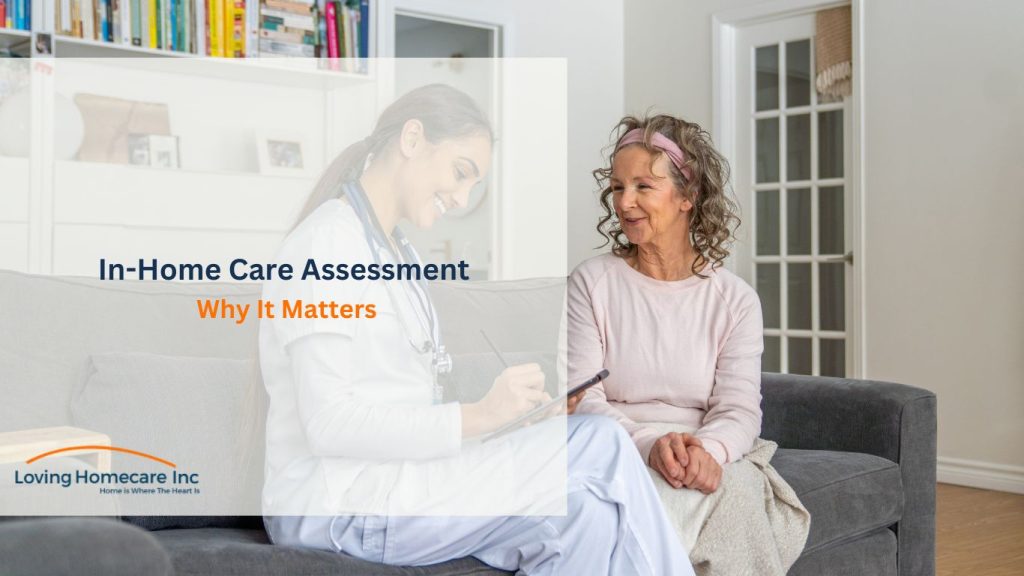As our loved ones age, their care needs become increasingly unique and complex. A one-size-fits-all approach simply does not work for seniors who wish to maintain their independence and dignity at home. An in-home care assessment is the foundation of effective elderly home care, enabling families and care providers to understand each individual’s specific needs, risks, and preferences.
According to the CDC, nearly 60% of adults in the U.S. live with at least one chronic condition, making early detection and tailored support critical for quality of life and safety.
At Loving Homecare, we believe that a thorough home care evaluation is the first step toward empowering seniors to age in place with confidence and comfort.
What Is an In-Home Care Assessment?

An in-home care assessment is a detailed, person-centred evaluation designed to understand the full spectrum of a senior’s health, daily living needs, emotional well-being, and living environment.
Conducted by trained professionals, such as registered nurses, care coordinators, or geriatric specialists, this assessment takes place in the comfort and familiarity of the senior’s own home.
Its purpose is to gather essential information that will guide the development of a personalised care plan, ensuring that every aspect of support is aligned with the individual’s current condition, lifestyle, and future care goals.
- Physical Health Review: Examination of medical history, current conditions, medications, and mobility.
- Cognitive Assessment: Evaluation of memory, decision-making, and mental status.
- Emotional Well-Being: Screening for depression, anxiety, and social engagement.
- Home Safety Evaluation: Identification of fall risks, accessibility issues, and environmental hazards.
- Activities of Daily Living (ADLs): Assessment of the ability to bathe, dress, eat, manage medications, and perform other essential tasks.
This holistic approach ensures that every aspect of a senior’s life is considered, providing a complete picture for a personalised care plan.
Why Is an In-Home Care Assessment Important?
A detailed senior care assessment offers several evidence-based benefits:
- Early Detection of Issues: Regular assessments enable the early identification of health concerns, which is crucial for managing chronic diseases and preventing complications.
- Personalised Care Plans: Assessments uncover individual needs and preferences, allowing for tailored interventions. Research shows that 78.1% of home health patients improved their functional status after receiving care based on thorough assessments.
- Enhanced Safety: Home safety evaluations reduce the risk of falls and injuries, a leading cause of hospitalisation among seniors, by identifying hazards and recommending modifications.
- Improved Quality of Life: Comprehensive geriatric assessments play a vital role in enhancing the effectiveness of in-home care services for seniors, increasing the likelihood that they remain healthy and independent at home.
- Caregiver Matching: Understanding specific needs ensures that the right caregiver is matched to each senior, fostering trust and better outcomes.
- Empowerment and Engagement: Seniors who actively participate in planning their in-home care services are more likely to adhere to treatment protocols, resulting in better health outcomes and improved emotional well-being.
What to Expect During the Assessment Process
The in-home care assessment process is designed to be thorough yet supportive:
- Scheduling: Contact Loving Homecare to arrange a convenient time for the assessment.
- Initial Consultation: A care coordinator meets with the senior and family to discuss health history, daily routines, and concerns.
- Comprehensive Evaluation: The assessor reviews medical records, observes daily activities, and evaluates the home environment for safety and accessibility.
- Care Needs Evaluation: Detailed questions about ADLs, cognitive abilities, and emotional health help determine the level and type of support needed.
- Follow-Up: After the assessment, a personalised care plan is developed and discussed with the family. Ongoing follow-ups ensure that the personal home care assistance provided continues to meet the senior’s evolving needs.
Typically, the initial assessment takes about an hour or more, with follow-up visits lasting 30–60 minutes, depending on the complexity of the senior’s needs.
How to Prepare for an In-Home Care Assessment

Families can take several steps to ensure a smooth and productive assessment:
- Gather Medical Records: Include medication lists, recent test results, and doctor’s notes.
- List Daily Routines and Challenges: Note any difficulties with ADLs or specific preferences that may influence the need for live-in care.
- Prepare Questions: Ask about available services, caregiver qualifications, and emergency protocols.
- Assess Home Safety: Identify any known hazards or areas of concern ahead of time.
- Involve Family Members: Their presence can provide emotional support and additional insights.
Being prepared ensures that the care team can develop a truly effective and personalised care plan.
Conclusion
In-home care assessments are the cornerstone of high-quality elderly home care. They provide the critical information needed to create personalised care plans, enhance safety, and improve the overall well-being of seniors. With evidence showing that regular assessments lead to better functional outcomes, fewer hospitalisations, and greater independence, there is no substitute for this essential step.
At Loving Home Care Inc, we are committed to helping families navigate this process with compassion and expertise

